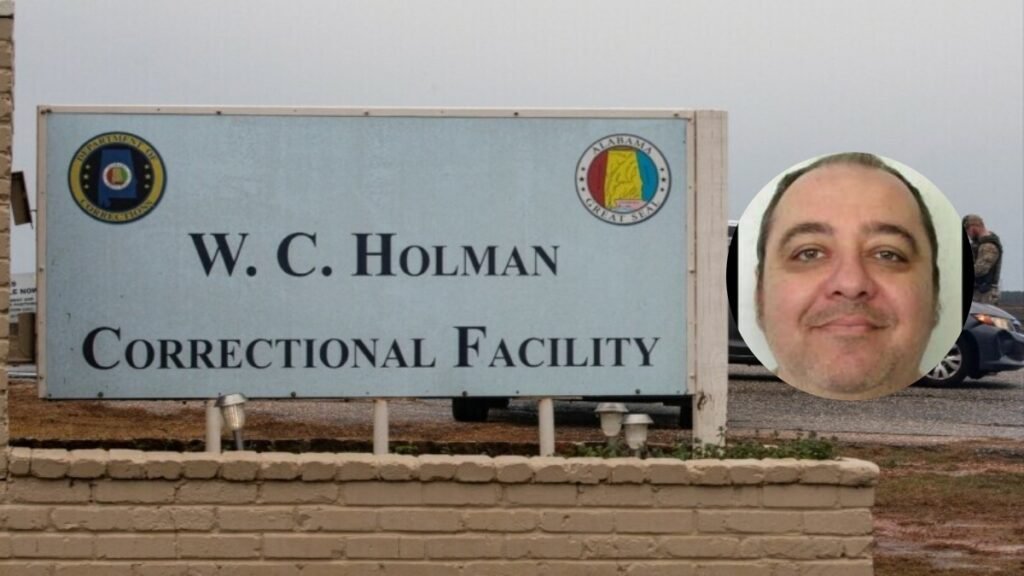
Atmore: Alabama has become the first state in the United States to execute a convicted murderer by nitrogen gas, a novel and untested method that has been condemned by human rights groups and experts as inhumane. The execution of Kenneth Eugene Smith on Thursday night has drawn criticism from the UN human rights chief and the European Union, who have expressed their opposition to the death penalty and their concern over the possible torture or ill-treatment of the prisoner.
The Execution of Kenneth Eugene Smith
Smith, 58, was sentenced to death for the 1988 murder-for-hire of a pastor’s wife, whom he shot in the head at close range. He had been on death row for more than three decades and had survived a botched execution attempt in November 2022, when prison officials failed to insert intravenous lines for a lethal injection.
On Thursday night, he was put to death at Holman Prison in Atmore, Alabama, by nitrogen hypoxia, a process that involves pumping nitrogen gas into a facemask, causing the inmate to suffocate. According to media witnesses, Smith “began writhing and thrashing for approximately two to four minutes, followed by around five minutes of heavy breathing,” local news outlet AL.com reported. He appeared to be “holding his breath as long as he could” and there was “involuntary movement” and gasping Alabama Department of Corrections Commissioner John Hamm told reporters.
Smith’s last words were, “Tonight, Alabama caused humanity to take a step backward,” according to the local CBS affiliate. “I am leaving with love, peace, and light… I love you. Thank you for supporting me. I love all of you,” he said. He was pronounced dead at 8:25 pm (local time), according to the state attorney general. “Justice has been served. Tonight, Kenneth Smith was put to death for the heinous act he committed over 35 years ago,” Attorney General Steve Marshall said in a statement.
The Controversy over Nitrogen Gas
Nitrogen gas has never been used before to execute humans in the United States, or anywhere else in the world, as far as we know. It is sometimes used to euthanize animals, but even then, the American Veterinary Medical Association recommends giving large animals a sedative before administering the gas. Alabama’s protocol for execution by nitrogen asphyxiation makes no provision for sedation.
The state of Alabama defended the method as “perhaps the most humane method of execution ever devised,” according to court documents. The state argued that nitrogen gas would cause a quick and painless death by depriving the brain of oxygen, without causing any physical suffering or distress. The state also claimed that the method was necessary because of the shortage and unavailability of lethal injection drugs, which have been boycotted by pharmaceutical companies and challenged by legal appeals.
However, the method has been challenged by human rights groups and experts, who have raised serious doubts about its safety and efficacy. They have argued that nitrogen gas could cause a prolonged and agonizing death by suffocation, which could amount to torture or cruel, inhuman, or degrading treatment, in violation of international law and standards. They have also pointed out that the method has not been scientifically tested or proven, and that there is a lack of transparency and accountability in its implementation.
“I deeply regret the execution of Kenneth Eugene Smith in Alabama despite serious concerns this novel and untested method of suffocation by nitrogen gas may amount to torture, or cruel, inhuman or degrading treatment,” UN human rights chief Volker Turk said in a brief statement on Friday.

In a statement, the EU “deeply” regretted the execution of Smith by nitrogen gas. “According to leading experts, this method is a particularly cruel and unusual punishment,” a European Union spokesman said in a statement. The 27-nation EU has a blanket opposition to the death penalty and regularly criticizes executions carried out around the globe.
Robin Maher, executive director of the Death Penalty Information Center, a non-profit organization that monitors capital punishment in the United States, called the execution of Smith by nitrogen gas “an untested, unproven method of execution.” “It’s never been used before to execute anyone in the United States, or anyone in the world as far as we know,” Maher told AFP.
The Future of the Death Penalty in the United States
The execution of Smith by nitrogen gas has raised questions about the future of the death penalty in the United States, which is one of the few developed countries that still retains capital punishment. According to the Death Penalty Information Center, there were 24 executions in the United States in 2023, all of them carried out by lethal injection. However, lethal injection has faced increasing legal and practical challenges, as states have struggled to obtain the drugs and to ensure their effectiveness and safety.
As a result, some states have sought alternative methods of execution, such as nitrogen gas, electric chair, firing squad, or hanging. Alabama is one of three US states that have approved the use of nitrogen hypoxia as a method of execution, along with Oklahoma and Mississippi. However, none of these methods have been used yet, except for Smith’s execution by nitrogen gas.
The use of these alternative methods has been met with opposition and litigation from death row inmates, human rights groups, and medical and legal experts, who have argued that they are unconstitutional and violate the Eighth Amendment’s prohibition of cruel and unusual punishments. They have also called for the abolition of the death penalty altogether, citing its arbitrariness, racial bias, wrongful convictions, high costs, and failure to deter crime.
The debate over the death penalty in the United States is likely to continue, as more states consider adopting or abolishing the practice, and as more cases reach the courts and public opinion. The execution of Smith by Nitrogen Gas has added a new dimension to the controversy, highlighting the ethical and legal dilemmas involved in taking a human life by the state.





















































